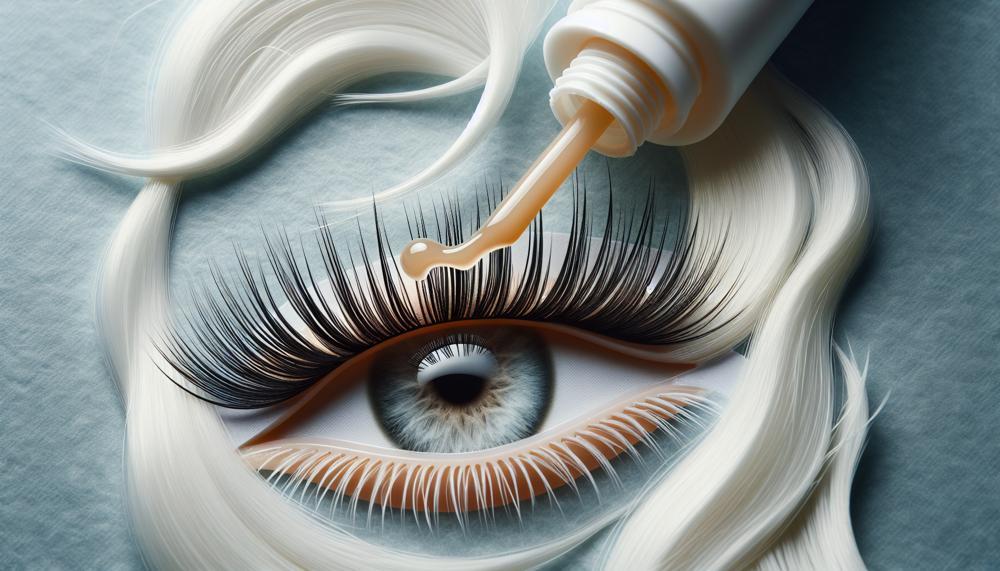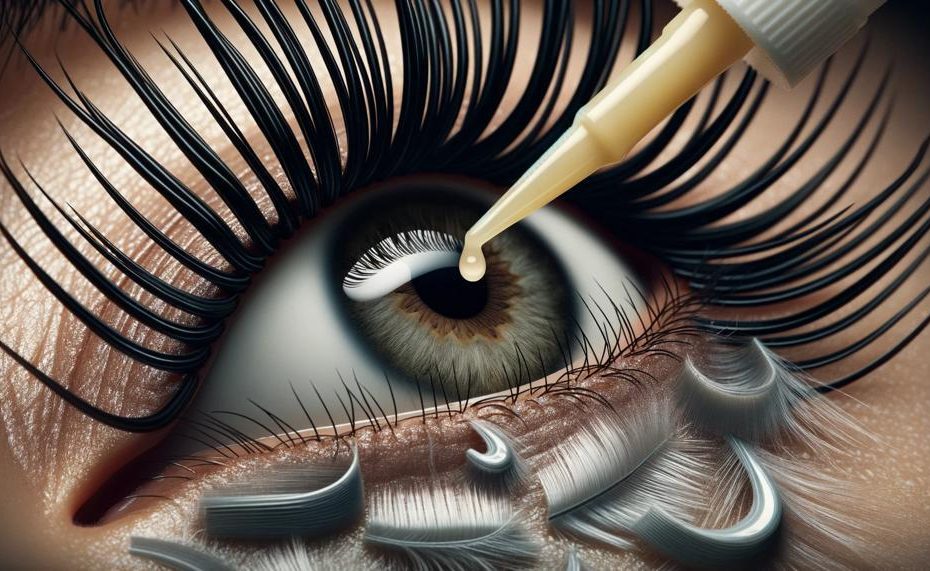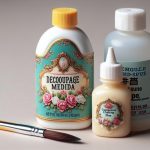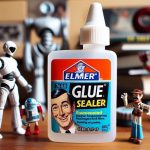Do you struggle with unmanageable hair and constantly search for the perfect hairstyle? Are you tired of spending a fortune on expensive salon treatments or damaging your locks with heat tools? Well, we may have just found a surprising solution to all your hair woes – and it involves a product that may already be in your beauty arsenal.
That’s right, we’re talking about eyelash glue. While it may seem like an unconventional choice, this adhesive used for falsies could have some unexpected benefits when it comes to taming your tresses. Before you dismiss this idea as crazy, let us share some key takeaways that will make you reconsider using eyelash glue on your hair:
- Say goodbye to pesky flyaways and frizz
- Achieve sleek and long-lasting hairstyles
- Save money by using a product you already own
- Avoid harsh chemicals and potential damage from heat tools
- Easy application and removal without any fuss
Intrigued? Keep reading as we delve into the details of this unique hack and how it could revolutionize your hair routine. Trust us, this could be the game-changing beauty secret you’ve been waiting for.
Table of Contents
- 1 Is it possible to use hair adhesive to attach eyelashes?
- 2 What’s in lash glue?
- 3 Why is hair glue so popular as a substitute for lash glue?
- 4 When it comes to eyelashes, is it okay to use hair bonding glue?
- 5 Elmer’s glue or super glue; can you use for eyelashes?
- 6 What are the risks associated with using hair glue as lash glue?
- 7 Conclusion
Is it possible to use hair adhesive to attach eyelashes?

To avoid pain, allergic reactions, and damage to the natural lashes, avoid using hair glue while attaching eyelashes. Eye area skin is too delicate to apply hair adhesive on, and it might be difficult to take off. To avoid any hazards or issues, it is strongly suggested to utilize items particularly formulated for eyelash attachment.
Additionally, using hair glue to affix eyelashes might change how the eyes look overall. Although it could provide a firm grip at first, it might lead to lash clumping and an uneven distribution, giving the appearance of false lashes. This may be particularly troublesome for those who have thin or sparse lashes since it can make them seem much thinner and more sparse.
It’s possible that the components in hair adhesive are inappropriate for use on the sensitive area around the eyes. This may result in uncomfortable side effects including irritation, redness, and pain that may need medical treatment. Products designed especially for eyelash attachment, on the other hand, are safer and more gentle when applied to this delicate region.
What’s in lash glue?
The components of hair glue often include silicone, oils, conditioning agents, alcohol, polymers, resins, scents, and preservatives. This mixture of substances gives the hair protection and nutrition in addition to a firm grip. On the other hand, improper application of hair glue may sometimes result in discomfort and damage.
Hair glue gets its powerful grip from the adhesive in it. Its purpose is to adhere and secure the hair strands together. You may make this glue with natural substances like vegetable gum or beeswax, or using synthetic materials. By covering the hair in a flexible film, the use of polymers and resins further strengthens the grip.
Formulas for hair glue often include alcohol as a solvent. This facilitates the dissolution of other components and makes spreading and application simpler. But excessive usage of alcohol may also dry out the scalp and hair.
Because silicone gives hair gloss and smoothness, it’s a prominent element in hair care products. It aids in establishing a shield between the hair and outside elements like heat or humidity in hair glue. Hair glue also contains oils to provide the hair hydration and nutrition.
In addition to helping to soften and detangle hair, conditioning chemicals shield it against environmental deterioration and style tool damage. To stop mold or bacteria from growing in the product, preservatives are required. Adding fragrances creates a pleasing aroma.
You can choose the best hair glue product for your requirements and guarantee correct use for results that are both fashionable and healthy by being aware of the components in the glue.
Why is hair glue so popular as a substitute for lash glue?
When it comes to keeping false lashes securely in place for an extended period, finding the right lash glue can be a challenge for many individuals. As a result, hair glue, known for its exceptionally strong hold on hair, has become a popular alternative for lash adhesive.
Hair glue offers an impressively robust hold that can last all day or even longer when used to secure fake lashes. Additionally, it is more widely available and often more affordable than traditional lash adhesive, making it a convenient option for those who cannot access or afford it.
This availability and cost-effectiveness make hair glue an attractive substitute for lash adhesive, especially for those who frequently use false lashes.
| Exceptionally strong hold and long-lasting formula | Many individuals struggle to find a lash glue that can keep false lashes securely in place for an extended period. Hair glue, known for its exceptionally strong hold on hair, has become a popular alternative for lash glue. | Using hair glue to secure fake lashes can provide an impressively robust hold that can last all day or even longer. |
| Availability and cost-effectiveness | Hair glue is more widely available and often more affordable than lash adhesive, making it a convenient option for those who cannot access or afford lash glue. | This makes hair glue an attractive substitute for lash adhesive, especially for frequent false lash users. |
| Familiarity and simplicity of use | Hair glue is a familiar product for many individuals, particularly those who frequently use it for hairstyling purposes. This familiarity may make hair glue appear to be a suitable substitute for lash adhesive. | In addition, hair glue is often easier to apply compared to lash adhesive, which may require more precision and experience. |
| Lack of knowledge about potential harm | Many people are unaware that hair glue is not safe for use on the eyes and can cause various issues such as irritation, allergic reactions, and damage to natural lashes. They may resort to using hair glue as a substitute for lash adhesive without realizing the potential harm it can cause. | It is crucial to educate oneself on the proper use of adhesives and their intended purposes to avoid any potential harm. |
| Convenience in professional settings | Hair glue is commonly used by professional hairstylists and makeup artists in their work. In some cases, they may also use it to apply false lashes, especially in a fast-paced setting where time is limited. This can lead to the misconception that hair glue is a safe and suitable substitute for lash adhesive. | It is essential to ensure that the correct adhesive is used in professional settings to avoid any potential harm or adverse reactions. |
When it comes to eyelashes, is it okay to use hair bonding glue?
Not at all. Despite having a strong adhesive appearance, hair bonding glue’s harsh ingredients may seriously damage the sensitive skin around the eyes and, in severe situations, even result in blindness. It is essential to use lash adhesive made especially for eyelashes since it is easier to remove without harming the hair follicles and is kinder to them.
In addition, ammonia hydroxide, a component of hair bonding glue, may cause allergic responses and is hard to remove without damaging your natural lashes. Only experts with extensive training who fully understand the correct application and removal methods should use it.
As a matter of fact, using hair bonding glue to your eyelashes might have detrimental effects. It may lead to long-term health problems in addition to causing skin irritation and harm to your lashes. To protect your health and wellbeing, always use lash glue that is designed especially for eyelashes.
Recall that safety should always come before convenience when it comes to cosmetics. Thus, the next time you find yourself tempted to apply hair bonding glue to your eyelashes, resist the urge and choose a less risky option.
Elmer’s glue or super glue; can you use for eyelashes?
Using Elmer’s glue or super glue as a replacement for proper eyelash glue is not recommended as it can be harmful to your skin and natural lashes.
These types of glue are not designed for use near the eyes and may cause irritation, redness, and damage. It’s crucial to use specialized lash glue that is safe and gentle on the skin to avoid any potential risks or harm.
| Dangers of using Elmer’s glue or super glue on eyelashes: | Safe alternatives to Elmer’s glue or super glue: |
| – Irritation and redness | – Specially formulated eyelash adhesives |
| – Damage to natural lashes | – Natural options like aloe vera gel or honey |
| – Difficulty in removal | – Properly removing eyelash glue with an oil-based makeup remover or warm water |
Moreover, removing Elmer’s glue or super glue from your eyelashes can be challenging and may require professional assistance. On the other hand, lash glue is specifically designed for use on the delicate eye area and is gentle on the skin. It also comes in a variety of formulas, including waterproof options, making it a reliable choice for keeping false lashes in place.
Additionally, there are safe alternatives to Elmer’s glue or super glue that are specially formulated for use on eyelashes. These include specifically designed eyelash adhesives or natural options like aloe vera gel or honey, which provide a secure and gentle hold for false lashes without any potential risks or damage to natural lashes.
What are the risks associated with using hair glue as lash glue?
There are a number of possible hazards and negative effects when using hair glue in place of lash adhesive. These include allergic reactions, premature lash loss, skin irritation, and removal challenges.
The sensitive area around the eyes is not the intended recipient of hair glue, which may include strong chemicals and adhesives that irritate the skin or burn it. Additionally, it could not have the same amount of lash glue adhesive strength, which might lead to early loosening or falling out of fake lashes.
In addition, hair glue could not go through the same rigorous safety testing as lash glue does, which raises the possibility of allergic responses.
Last but not least, hair glue could be harder to remove and might need more aggressive techniques that might damage both natural and fake lashes. To prevent these side effects and preserve healthy lashes, it is important to utilize treatments made especially for the eye region.
Conclusion
To sum it up, using eyelash glue on your hair may seem unconventional, but it can have surprising benefits.
It can tame flyaways and frizz, give you sleek and long-lasting hairstyles, save money, and avoid harsh chemicals and heat damage. However, caution and knowledge are key when trying this hack.
Using hair adhesive for lashes or vice versa can lead to serious risks like skin irritation, allergic reactions, and damage to natural lashes. Stick with products made specifically for their intended use to prioritize safety and achieve healthy and beautiful results.
So next time you’re struggling with unruly hair or in need of a new hairstyle, why not give this unconventional hack a try?






